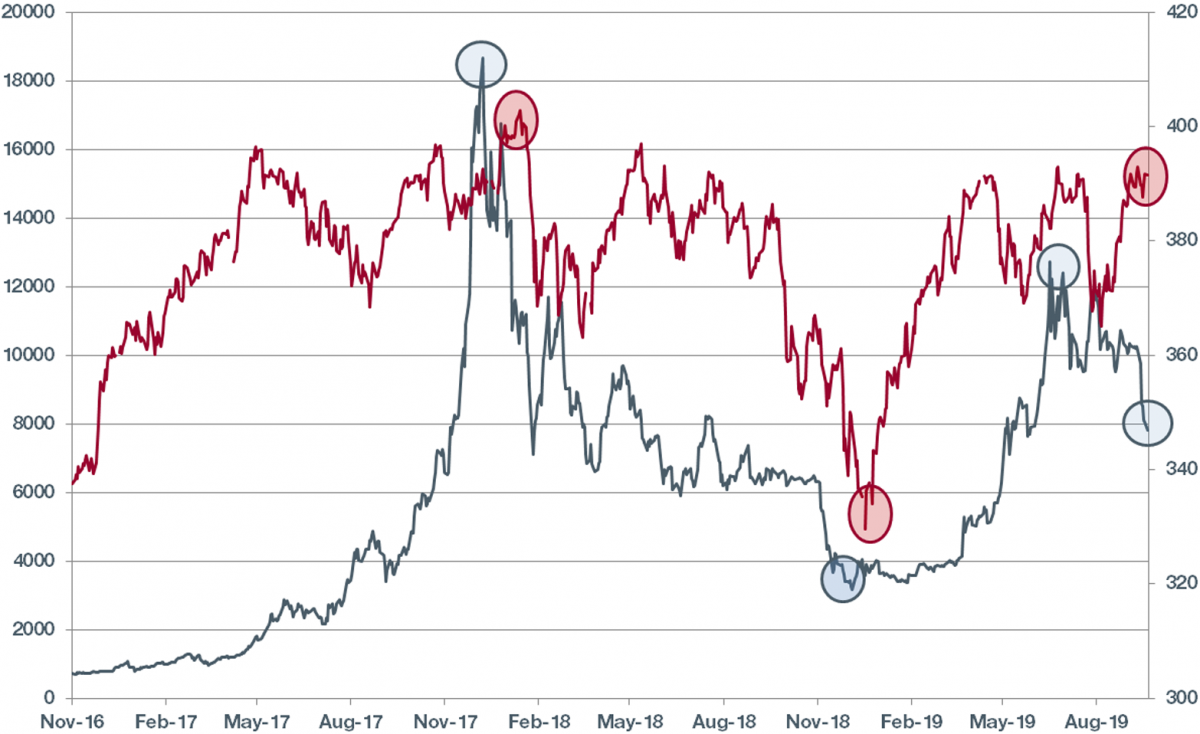30/09/2019
Flash boursier
Key data
| USD/CHF | EUR/CHF | SMI | EURO STOXX 50 | DAX 30 | CAC 40 | FTSE 100 | S&P 500 | NASDAQ | NIKKEI | MSCI Emerging MArkets | |
|---|---|---|---|---|---|---|---|---|---|---|---|
| Latest | 0.99 | 1.08 | 10'037.81 | 3'545.88 | 12'380.94 | 5'640.58 | 7'426.21 | 2'961.79 | 7'939.63 | 21'878.90 | 1'001.50 |
| Trend | |||||||||||
| %YTD | 0.95% | -3.85% | 19.08% | 18.14% | 17.26% | 19.23% | 10.38% | 18.15% | 19.66% | 9.31% | 3.70% |
Highlights:
1. Manufacturing indicators on the slide
2. Worrying political developments in the US
Rumours of Wall Street ban on Chinese firms
At the moment, it looks as if equity markets are disconnected from economic fundamentals, that is, the near-universal slowdown in growth and the downward revisions in corporate earnings estimates. Despite the bad news on economic and political fronts, major indices have been holding up on hopes of a resolution to the trade conflict. US and Chinese delegations are due to meet on 10 and 11 October, ahead of which China has said it could buy more US goods. In the meantime, the WTO has authorised the US to levy close to $8bn of duties on European exports (mainly luxury goods and aerospace equipment).
Manufacturing indices continue to contract, especially in the Euro-area, where the readings are at their lowest levels since 2012. Germany’s latest PMI was a mere 41.4 – the worst score in a decade. Services are apparently not doing so well either. Germany is due to announce, later in the year, a raft of fiscal measures including corporate tax cuts and increases in infrastructure spending. In the US, orders of durable goods most recently increased by 0.2%. By contrast, growth in consumer spending has slowed, rising by a token 0.1% last time round. China’s manufacturing PMI for September edged down to 49.8 while the services reading was 53.7. However, export orders improved. Companies’ earnings are decreasing, according to China’s ‘beige book’.
The political context is becoming a matter of concern in the US following the launch of impeachment proceedings by the Democrat-led House, in connection with a telephone conversation between American and Ukrainian presidents. As Republicans have the majority in the Senate, this action is likely to go nowhere, but it has meanwhile stoked volatility in equity markets and sent investors piling into defensive stocks. Rumours about capital controls targeting US companies’ investments in China and a listing ban on Chinese companies, barring them from the US stock exchange, raised the fear gauge even higher.
Tech stocks have staged a sharp correction, cancelling out the bounce following Donald Trump’s more upbeat remarks on a possible trade deal in the near future.
The news concerning Wall Street was subsequently denied by the US Treasury Department, which stated that it had no plans to limit the access of Chinese firms to US capital markets. Given the sheer volume of Treasury Bonds held by China, the retaliatory measures would send a real shockwave through rates markets.
Bitcoin – a leading indicator for equities?
The economic news keeps on getting worse and worse but equity markets continue riding along at near all-time highs.
Citigroup has an ‘economic surprises’ indicator, which is derived from the difference between the expectations of market participants with regard to a selected set of economic indicators and the actual reported values of these indicators. The European version of this indicator is deteriorating but European equities have been undaunted. This degree of divergence is remarkable but is probably due to negative bond yields, which are sending investors looking for higher returns (at the price of higher risk). Another factor is the ECB’s cash injections into the system, which instead of making their way to Main Street have ended up in financial markets.
Among the financial indicators tracking ‘general sentiment’, the Bitcoin (grey) has quite faithfully predicted the upturn in European equities (Stoxx600, coloured red). Bitcoin peaked in mid-December 2017, one month ahead of the sharp downswing in shares that began in mid-January 2018. The price of Bitcoin then bottomed out in mid-December 2018, two weeks before the equity market did.
Since peaking in June 2019, Bitcoin has shed close to 40% of its value. Will equities follow its lead this time?

Download the Flash boursier (pdf)


 Flash boursier
Flash boursier